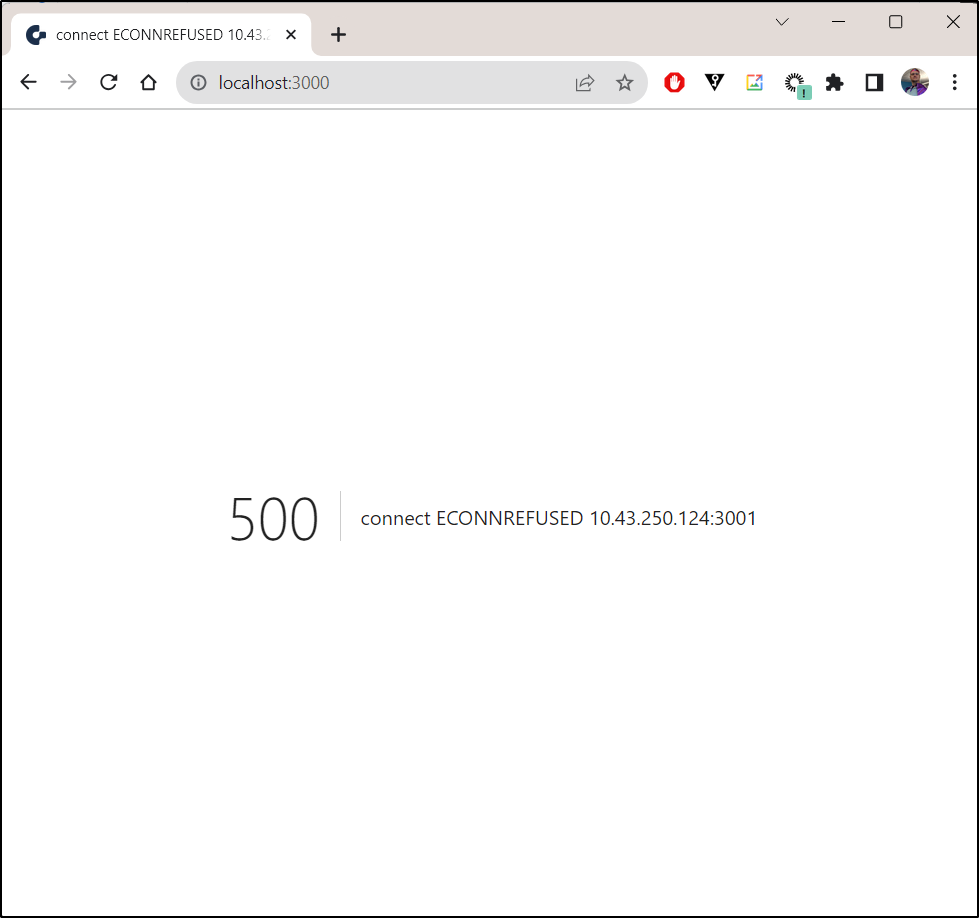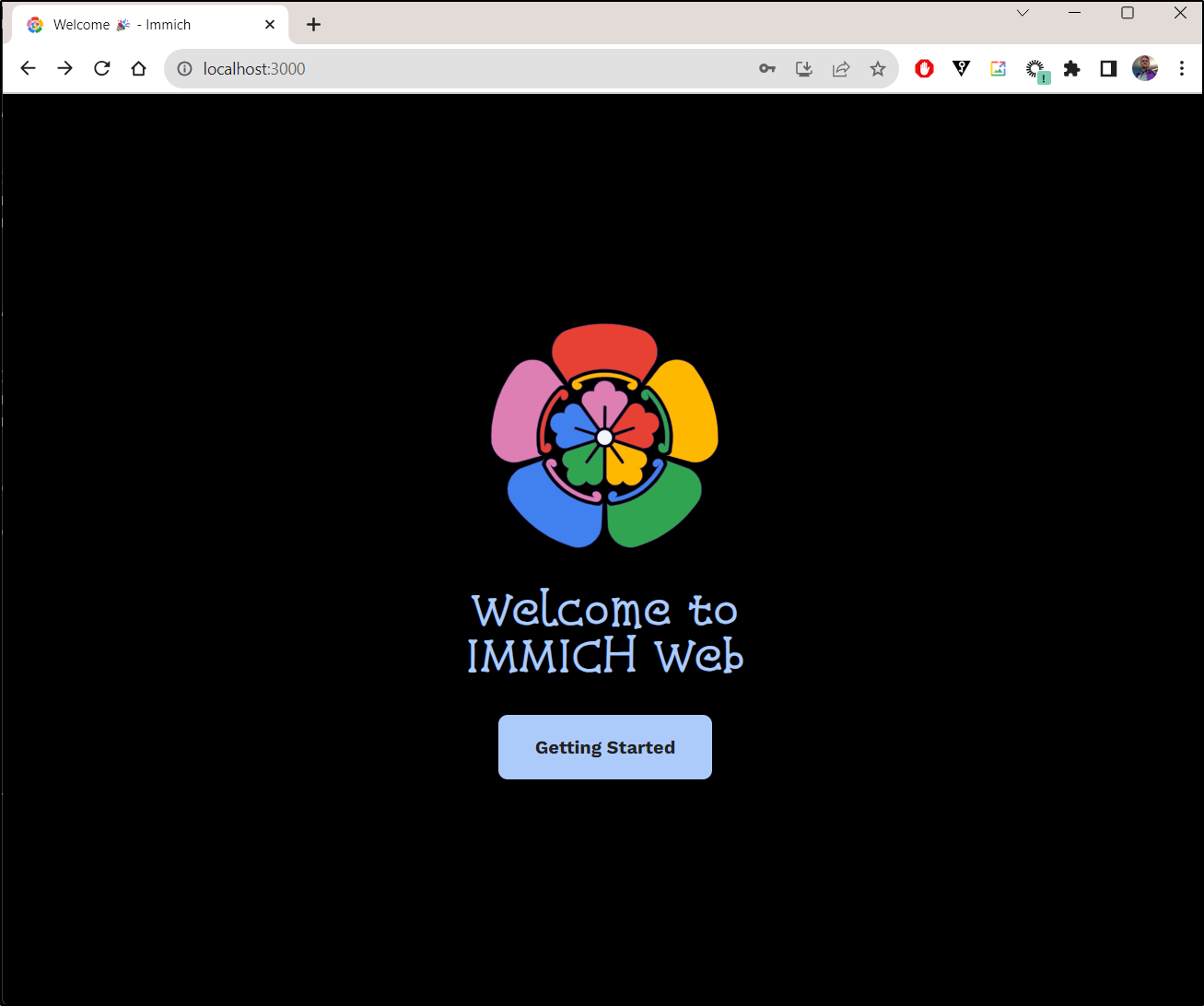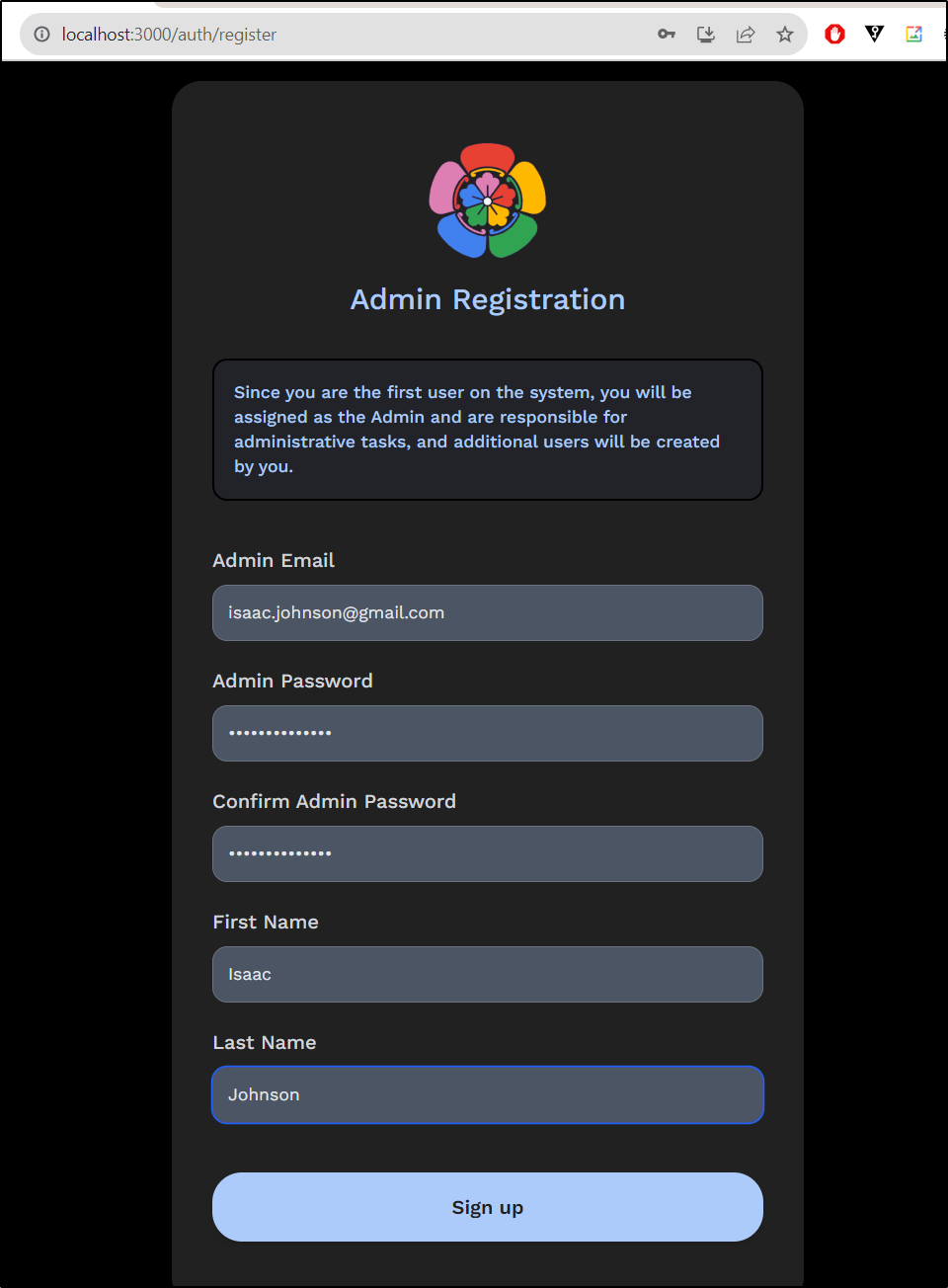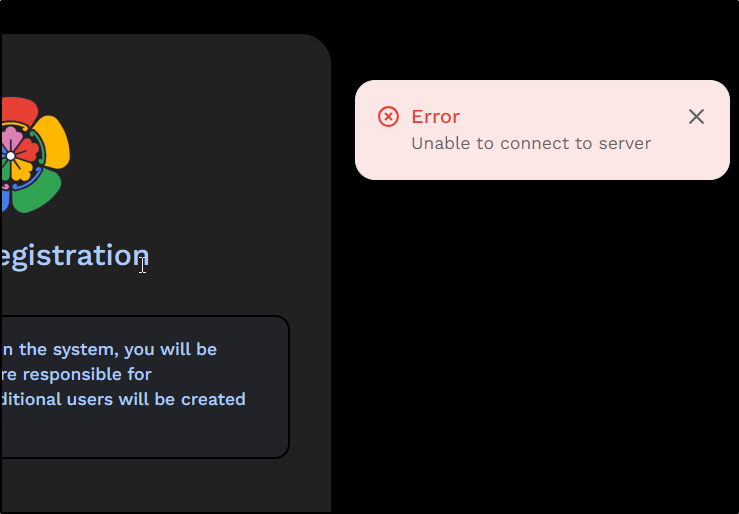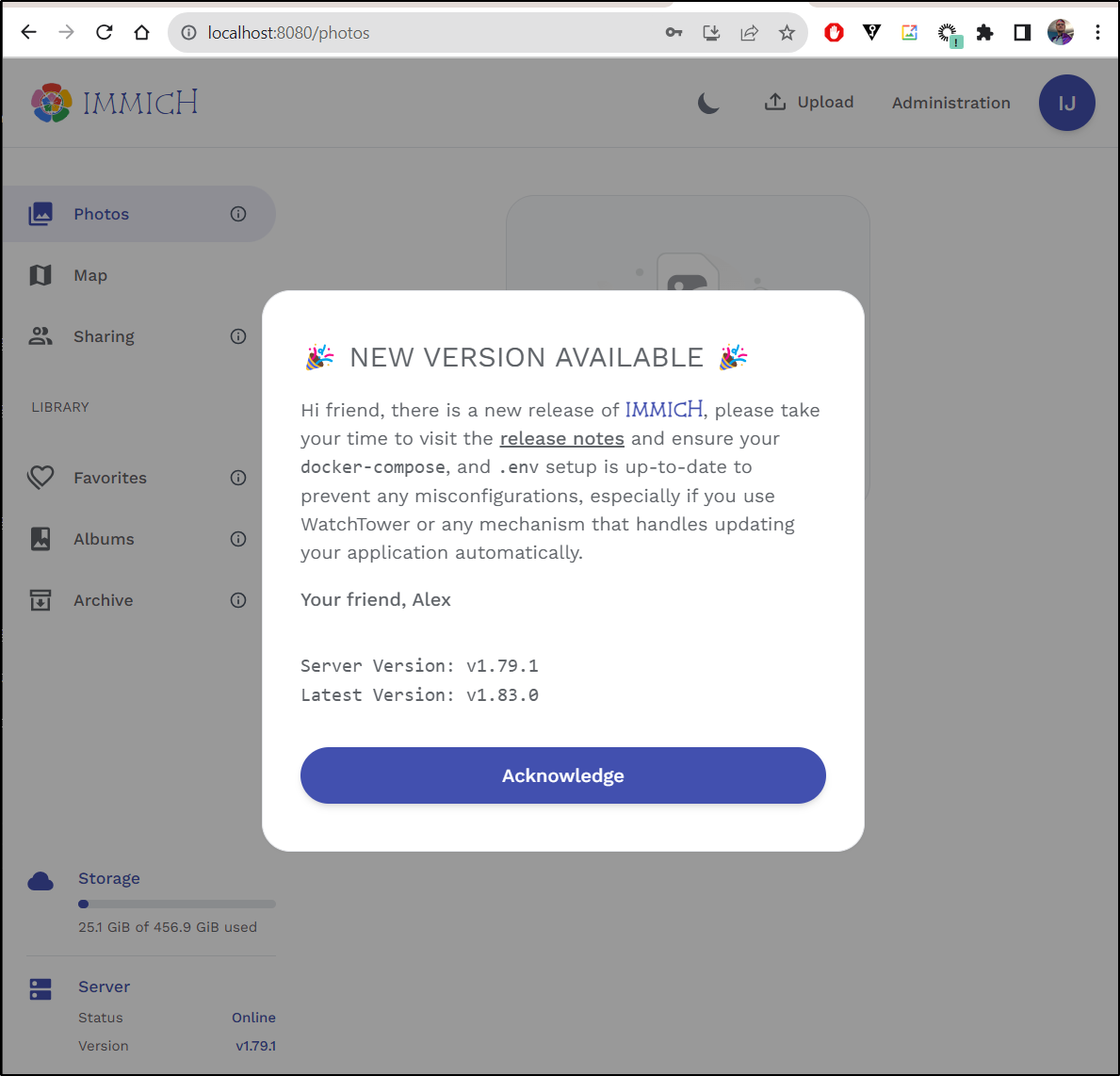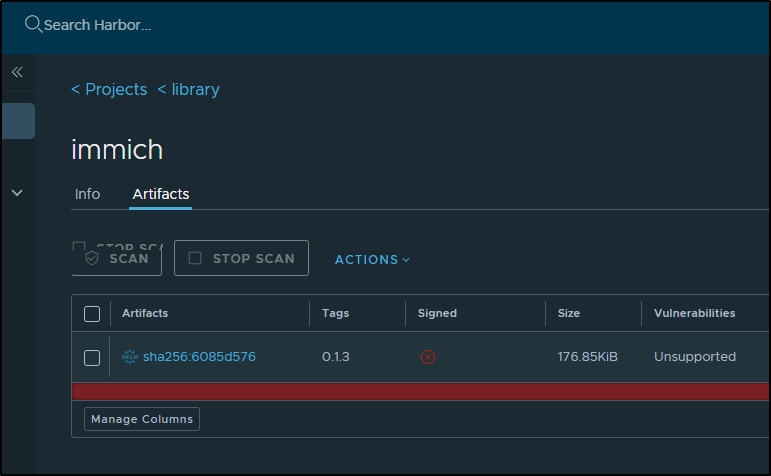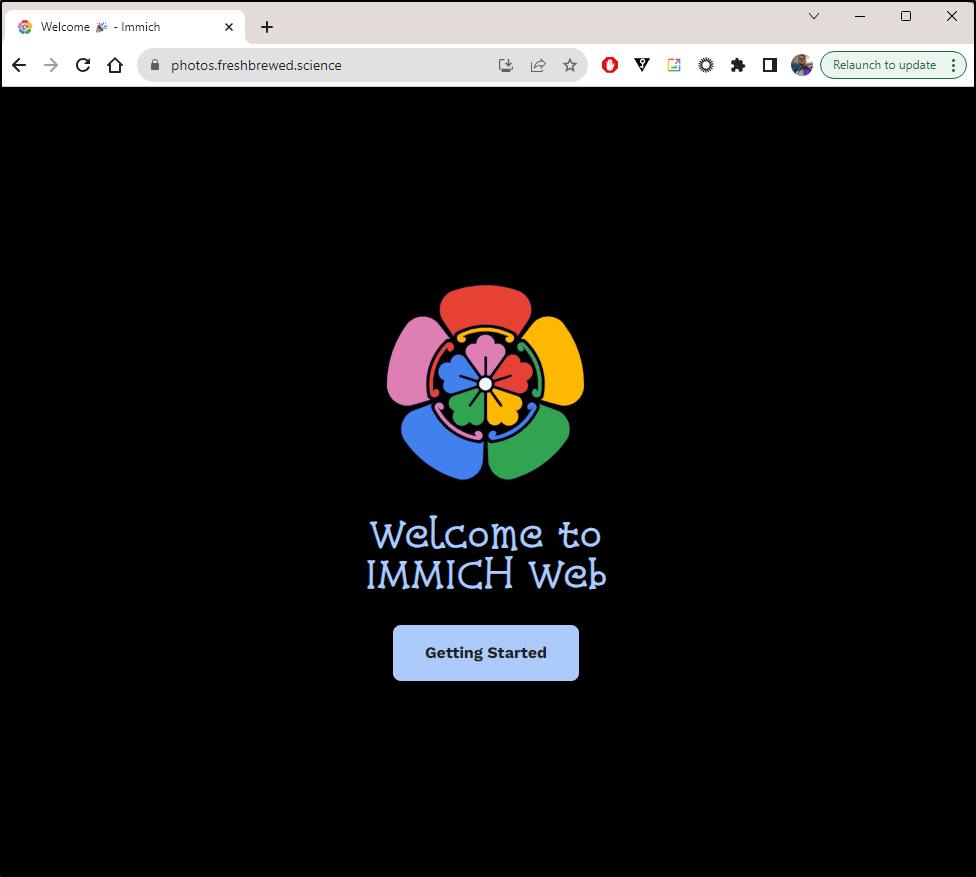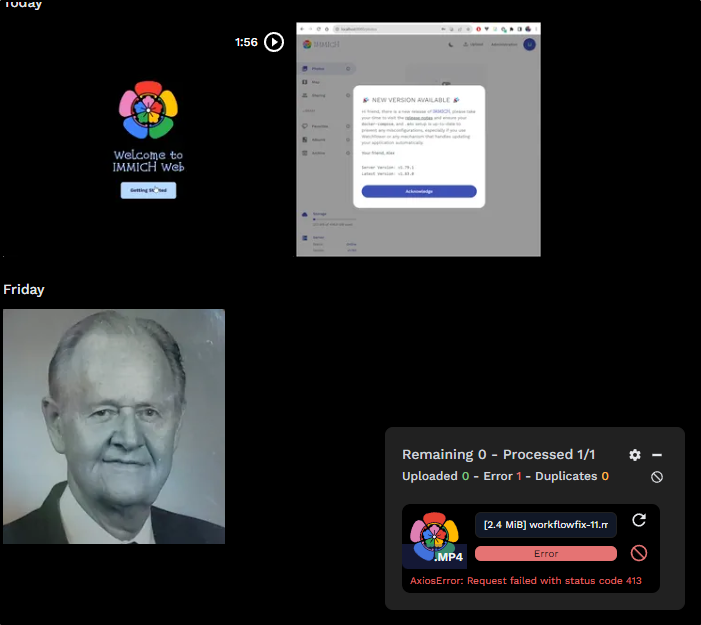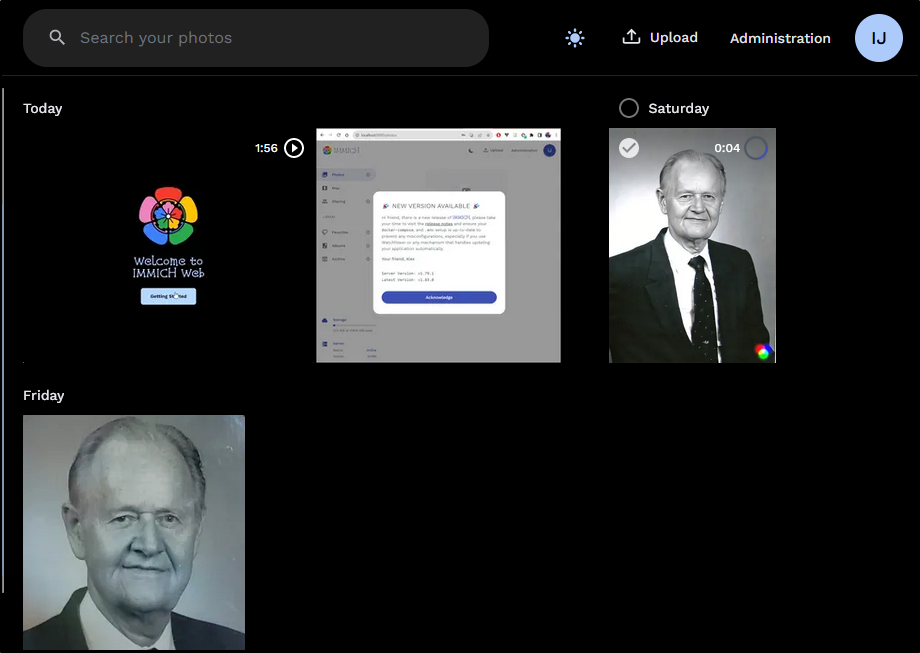Published: Nov 9, 2023 by Isaac Johnson
Immich is a fully open-source project for “Self-Hosted” “Photos and Videos” that supports web and mobile devices. It was created (and maintained) by Alex Tran. In fact, I think it’s so good, I bought him a coffee.
You can host it many ways, from just a Linux install through to Docker, Docker Compose and Kubernetes. Since I’m fundamentally a K8s guy, I went that route.
Let’s dig in! (And if you want to see an example of the end, here is a link of art ideas for this post as self-hosted in Immich)
Installing
Let’s clone the repo
builder@LuiGi17:~/Workspaces$ git clone https://github.com/immich-app/immich-charts.git
Cloning into 'immich-charts'...
remote: Enumerating objects: 546, done.
remote: Counting objects: 100% (546/546), done.
remote: Compressing objects: 100% (189/189), done.
remote: Total 546 (delta 294), reused 518 (delta 272), pack-reused 0
Receiving objects: 100% (546/546), 112.84 KiB | 1.08 MiB/s, done.
Resolving deltas: 100% (294/294), done.
I’ll then create a namespaces
builder@LuiGi17:~/Workspaces/immich-charts$ kubectl create ns immich
namespace/immich created
Oddly, this chart doesn’t automatically create a PVC, so we’ll need to do that.
builder@LuiGi17:~/Workspaces/immich-charts$ cat immich.pvc.yaml
apiVersion: v1
kind: PersistentVolumeClaim
metadata:
name: immich-vol
spec:
accessModes:
- ReadWriteOnce
resources:
requests:
storage: 5Gi
storageClassName: local-path
volumeMode: Filesystem
builder@LuiGi17:~/Workspaces/immich-charts$ kubectl apply -f immich.pvc.yaml
persistentvolumeclaim/immich-vol created
Now we are able to install via helm
builder@LuiGi17:~/Workspaces/immich-charts$ helm install immichtest -n immich ./charts/immich/ --set immich.persistence.library.existingClaim=immich-vol
NAME: immichtest
LAST DEPLOYED: Sun Oct 29 19:49:41 2023
NAMESPACE: immich
STATUS: deployed
REVISION: 1
TEST SUITE: None
My one goof there was to create the PVC in the default namespace:
builder@LuiGi17:~/Workspaces/jekyll-blog$ kubectl get pvc -n immich
No resources found in immich namespace.
builder@LuiGi17:~/Workspaces/jekyll-blog$ kubectl get pvc
NAME STATUS VOLUME CAPACITY ACCESS MODES STORAGECLASS AGE
immich-vol Pending local-path 11m
which was blocking the pods from coming up
$ kubectl get pods -n immich
NAME READY STATUS RESTARTS AGE
immichtest-server-6dfc4cff-2q4df 0/1 Pending 0 9m24s
immichtest-machine-learning-6578fb7f8b-8cmkg 0/1 Pending 0 9m24s
immichtest-microservices-5fd4c5445c-qpg76 0/1 Pending 0 9m24s
immichtest-proxy-c97965d58-nsbdn 1/1 Running 0 9m24s
immichtest-web-58d6d6478-dwwfs 1/1 Running 0 9m24s
I went back and created it in the namespace
builder@LuiGi17:~/Workspaces/immich-charts$ kubectl apply -f immich.pvc.yaml -n immich
persistentvolumeclaim/immich-vol created
builder@LuiGi17:~/Workspaces/immich-charts$ kubectl get pvc -n immich
NAME STATUS VOLUME CAPACITY ACCESS MODES STORAGECLASS AGE
immich-vol Pending local-path 8s
builder@LuiGi17:~/Workspaces/immich-charts$ kubectl get pvc -n immich
NAME STATUS VOLUME CAPACITY ACCESS MODES STORAGECLASS AGE
immich-vol Bound pvc-bb1639a8-a84a-4f61-9b3e-1160549c5fa2 5Gi RWO local-path 11s
Now I can see the pods coming up
$ kubectl get pods -n immich
NAME READY STATUS RESTARTS AGE
immichtest-proxy-c97965d58-nsbdn 1/1 Running 0 10m
immichtest-web-58d6d6478-dwwfs 1/1 Running 0 10m
immichtest-server-6dfc4cff-2q4df 0/1 ContainerCreating 0 10m
immichtest-microservices-5fd4c5445c-qpg76 0/1 ContainerCreating 0 10m
immichtest-machine-learning-6578fb7f8b-8cmkg 0/1 ContainerCreating 0 10m
I tried port-forwarding but it didn’t work
$ kubectl port-forward svc/immichtest-web -n immich 3000:3000
Forwarding from 127.0.0.1:3000 -> 3000
Forwarding from [::1]:3000 -> 3000
Handling connection for 3000
Handling connection for 3000
Handling connection for 3000
Handling connection for 3000
The errors from the microservices pod suggest it needs a Redis instance
Error: getaddrinfo ENOTFOUND immichtest-redis-master
at GetAddrInfoReqWrap.onlookup [as oncomplete] (node:dns:108:26) {
errno: -3008,
code: 'ENOTFOUND',
syscall: 'getaddrinfo',
hostname: 'immichtest-redis-master'
}
I’ll enable the redis section in the chart with a set
$ helm upgrade immichtest -n immich ./charts/immich/ --set immich.persistence.library.existingClaim=immich-vol --set redis.enabled=true
Release "immichtest" has been upgraded. Happy Helming!
NAME: immichtest
LAST DEPLOYED: Sun Oct 29 20:09:16 2023
NAMESPACE: immich
STATUS: deployed
REVISION: 2
TEST SUITE: None
Which showed we also need PostgreSQL instance
builder@LuiGi17:~/Workspaces/immich-charts$ kubectl logs immichtest-server-6dfc4cff-2q4df -n immich
[Nest] 6 - 10/30/2023, 1:11:07 AM LOG [NestFactory] Starting Nest application...
[Nest] 6 - 10/30/2023, 1:11:07 AM LOG [InstanceLoader] TypeOrmModule dependencies initialized +74ms
[Nest] 6 - 10/30/2023, 1:11:07 AM LOG [InstanceLoader] BullModule dependencies initialized +0ms
[Nest] 6 - 10/30/2023, 1:11:07 AM LOG [InstanceLoader] ConfigHostModule dependencies initialized +2ms
[Nest] 6 - 10/30/2023, 1:11:07 AM LOG [InstanceLoader] DiscoveryModule dependencies initialized +0ms
[Nest] 6 - 10/30/2023, 1:11:07 AM LOG [InstanceLoader] ConfigModule dependencies initialized +7ms
[Nest] 6 - 10/30/2023, 1:11:07 AM LOG [InstanceLoader] ScheduleModule dependencies initialized +0ms
[Nest] 6 - 10/30/2023, 1:11:07 AM LOG [InstanceLoader] BullModule dependencies initialized +0ms
[Nest] 6 - 10/30/2023, 1:11:07 AM LOG [InstanceLoader] BullModule dependencies initialized +1ms
[Nest] 6 - 10/30/2023, 1:11:07 AM ERROR [TypeOrmModule] Unable to connect to the database. Retrying (1)...
Error: getaddrinfo ENOTFOUND immichtest-postgresql
at GetAddrInfoReqWrap.onlookup [as oncomplete] (node:dns:108:26)
[Nest] 6 - 10/30/2023, 1:11:10 AM ERROR [TypeOrmModule] Unable to connect to the database. Retrying (2)...
Error: getaddrinfo ENOTFOUND immichtest-postgresql
at GetAddrInfoReqWrap.onlookup [as oncomplete] (node:dns:108:26)
[Nest] 6 - 10/30/2023, 1:11:13 AM ERROR [TypeOrmModule] Unable to connect to the database. Retrying (3)...
Error: getaddrinfo ENOTFOUND immichtest-postgresql
at GetAddrInfoReqWrap.onlookup [as oncomplete] (node:dns:108:26)
Since I’m using the upgrade command, even if PSQL isn’t present, I need to provide a password to use
$ helm upgrade immichtest -n immich ./charts/immich/ --set immich.persistence.library.existingClaim=immich-vol --set redis.enabled=true --set postgresql.enabled=true --set global.postgresql.auth.postgresPassword=DBPassword123
Release "immichtest" has been upgraded. Happy Helming!
NAME: immichtest
LAST DEPLOYED: Sun Oct 29 20:13:49 2023
NAMESPACE: immich
STATUS: deployed
REVISION: 3
TEST SUITE: None
We can rotate the pods to get them to start
builder@LuiGi17:~/Workspaces/immich-charts$ kubectl delete pod immichtest-microservices-5fd4c5445c-qpg76 -n immich
pod "immichtest-microservices-5fd4c5445c-qpg76" deleted
builder@LuiGi17:~/Workspaces/immich-charts$ kubectl delete pod immichtest-server-6dfc4cff-2q4df -n immich
pod "immichtest-server-6dfc4cff-2q4df" deleted
builder@LuiGi17:~/Workspaces/immich-charts$
builder@LuiGi17:~/Workspaces/immich-charts$ kubectl get pods -n immich
NAME READY STATUS RESTARTS AGE
immichtest-proxy-c97965d58-nsbdn 1/1 Running 0 27m
immichtest-web-58d6d6478-dwwfs 1/1 Running 0 27m
immichtest-machine-learning-6578fb7f8b-8cmkg 1/1 Running 1 (13m ago) 27m
immichtest-redis-master-0 1/1 Running 0 3m13s
immichtest-postgresql-0 1/1 Running 0 3m20s
immichtest-microservices-5fd4c5445c-wpsml 1/1 Running 0 68s
immichtest-server-6dfc4cff-jb6bg 1/1 Running 0 34s
Now port-forwarding gives me a “Getting Started” page
I’ll fill in the signup page
But it dies here
I realized I needed to use the Proxy service instead
$ kubectl port-forward svc/immichtest-proxy -n immich 8080:8080
Forwarding from 127.0.0.1:8080 -> 8080
Forwarding from [::1]:8080 -> 8080
Handling connection for 8080
Handling connection for 8080
Which let me login
We can now test it out
Production cluster
This seems like an app I’ll want to explore more. I’ll go ahead and launch it in my production cluster
I’ll create an R53 entry
builder@LuiGi17:~/Workspaces/jekyll-blog$ cat r53-photos.json
{
"Comment": "CREATE photos fb.s A record ",
"Changes": [
{
"Action": "CREATE",
"ResourceRecordSet": {
"Name": "photos.freshbrewed.science",
"Type": "A",
"TTL": 300,
"ResourceRecords": [
{
"Value": "75.73.224.240"
}
]
}
}
]
}
builder@LuiGi17:~/Workspaces/jekyll-blog$ aws route53 change-resource-record-sets --hosted-zone-id Z39E8QFU0F9PZP --change-batch file://r53-photos.json
{
"ChangeInfo": {
"Id": "/change/C08093172IQ4HZR0BE8TC",
"Status": "PENDING",
"SubmittedAt": "2023-10-30T02:35:14.686Z",
"Comment": "CREATE photos fb.s A record "
}
}
I’ll then want the charts downloaded, but also saved for later in Harbor.
builder@DESKTOP-QADGF36:~/Workspaces/immich-charts/charts$ helm package immich
Error: found in Chart.yaml, but missing in charts/ directory: common, postgresql, redis
builder@DESKTOP-QADGF36:~/Workspaces/immich-charts/charts$ helm dependency build immich/
Getting updates for unmanaged Helm repositories...
...Successfully got an update from the "https://bjw-s.github.io/helm-charts" chart repository
Hang tight while we grab the latest from your chart repositories...
...Successfully got an update from the "btungut" chart repository
...Successfully got an update from the "jfelten" chart repository
...Successfully got an update from the "ngrok" chart repository
...Successfully got an update from the "confluentinc" chart repository
...Successfully got an update from the "azure-samples" chart repository
...Successfully got an update from the "kube-state-metrics" chart repository
...Successfully got an update from the "zabbix-community" chart repository
...Successfully got an update from the "rhcharts" chart repository
...Successfully got an update from the "kuma" chart repository
...Successfully got an update from the "adwerx" chart repository
...Unable to get an update from the "freshbrewed" chart repository (https://harbor.freshbrewed.science/chartrepo/library):
failed to fetch https://harbor.freshbrewed.science/chartrepo/library/index.yaml : 404 Not Found
...Unable to get an update from the "myharbor" chart repository (https://harbor.freshbrewed.science/chartrepo/library):
failed to fetch https://harbor.freshbrewed.science/chartrepo/library/index.yaml : 404 Not Found
...Successfully got an update from the "portainer" chart repository
...Successfully got an update from the "novum-rgi-helm" chart repository
...Successfully got an update from the "nfs" chart repository
...Successfully got an update from the "actions-runner-controller" chart repository
...Successfully got an update from the "longhorn" chart repository
...Successfully got an update from the "dapr" chart repository
...Successfully got an update from the "nginx-stable" chart repository
...Successfully got an update from the "opencost" chart repository
...Successfully got an update from the "lifen-charts" chart repository
...Successfully got an update from the "hashicorp" chart repository
...Successfully got an update from the "sonarqube" chart repository
...Successfully got an update from the "akomljen-charts" chart repository
...Successfully got an update from the "kiwigrid" chart repository
...Successfully got an update from the "castai-helm" chart repository
...Successfully got an update from the "sumologic" chart repository
...Unable to get an update from the "epsagon" chart repository (https://helm.epsagon.com):
Get "https://helm.epsagon.com/index.yaml": dial tcp: lookup helm.epsagon.com on 172.22.64.1:53: no such host
...Successfully got an update from the "kubecost" chart repository
...Successfully got an update from the "gitea-charts" chart repository
...Successfully got an update from the "openzipkin" chart repository
...Successfully got an update from the "rook-release" chart repository
...Successfully got an update from the "elastic" chart repository
...Successfully got an update from the "harbor" chart repository
...Successfully got an update from the "open-telemetry" chart repository
...Successfully got an update from the "signoz" chart repository
...Successfully got an update from the "argo-cd" chart repository
...Successfully got an update from the "incubator" chart repository
...Successfully got an update from the "uptime-kuma" chart repository
...Successfully got an update from the "rancher-latest" chart repository
...Successfully got an update from the "datadog" chart repository
...Successfully got an update from the "crossplane-stable" chart repository
...Successfully got an update from the "newrelic" chart repository
...Successfully got an update from the "grafana" chart repository
...Successfully got an update from the "gitlab" chart repository
...Successfully got an update from the "prometheus-community" chart repository
...Successfully got an update from the "bitnami" chart repository
Update Complete. ⎈Happy Helming!⎈
Saving 3 charts
Downloading common from repo https://bjw-s.github.io/helm-charts
Downloading postgresql from repo https://charts.bitnami.com/bitnami
Downloading redis from repo https://charts.bitnami.com/bitnami
Deleting outdated charts
builder@DESKTOP-QADGF36:~/Workspaces/immich-charts/charts$ helm package immich
Successfully packaged chart and saved it to: /home/builder/Workspaces/immich-charts/charts/immich-0.1.3.tgz
builder@DESKTOP-QADGF36:~/Workspaces/immich-charts/charts$ helm push immich-0.1.3.tgz oci://harbor.freshbrewed.science/l
ibrary/
Pushed: harbor.freshbrewed.science/library/immich:0.1.3
Digest: sha256:6085d5763fefac3ea18706a3fd1be3f5ffeea40f3a2672271b91a536eefde429
I can now see the chart as an OCI artifact in Harbor. Not as ideal as a proper Chart Repo, but we’ll come back to that later.
As before, I’ll create my namespace
$ kubectl create ns immich
namespace/immich created
I’ll create the PVC, this time using NFS as my storage class
builder@DESKTOP-QADGF36:~/Workspaces/immich-charts/charts$ cat immich-pvc.yaml
apiVersion: v1
kind: PersistentVolumeClaim
metadata:
annotations:
volume.beta.kubernetes.io/storage-provisioner: fuseim.pri/ifs
volume.kubernetes.io/storage-provisioner: fuseim.pri/ifs
labels:
app.kubernetes.io/instance: immichprod
name: immichpvc
namespace: immich
spec:
accessModes:
- ReadWriteOnce
resources:
requests:
storage: 10Gi
storageClassName: managed-nfs-storage
volumeMode: Filesystem
builder@DESKTOP-QADGF36:~/Workspaces/immich-charts/charts$ kubectl apply -f immich-pvc.yaml
persistentvolumeclaim/immichpvc created
Now there is a section in the values for letting Helm set the ingress
proxy:
enabled: true
image:
repository: ghcr.io/immich-app/immich-proxy
pullPolicy: IfNotPresent
persistence:
library:
enabled: false
ingress:
main:
enabled: false
annotations:
# proxy-body-size is set to 0 to remove the body limit on file uploads
nginx.ingress.kubernetes.io/proxy-body-size: "0"
hosts:
- host: immich.local
paths:
- path: "/"
tls: []
But I was seeing a lot of threads on stackoverflow on struggles folks had.
I’ll KISS and create the ingress myself after the service is up and running.
$ helm install immichprod -n immich ./immich/ --set immich.persistence.library.existingClaim=immichpvc --set redis.enabled=true --set postgresql.enabled=true --set global.postgresql.auth.postgresPassword=DBPassword123
NAME: immichprod
LAST DEPLOYED: Mon Oct 30 06:51:00 2023
NAMESPACE: immich
STATUS: deployed
REVISION: 1
TEST SUITE: None
builder@DESKTOP-QADGF36:~/Workspaces/immich-charts/charts$
I saw the pods up and running
$ kubectl get pods -n immich
NAME READY STATUS RESTARTS AGE
immichprod-proxy-7cbc7bf69f-4nfpw 1/1 Running 0 3m29s
immichprod-web-59759c645f-9klw4 1/1 Running 0 3m29s
immichprod-postgresql-0 1/1 Running 0 3m28s
immichprod-redis-master-0 1/1 Running 0 3m28s
immichprod-microservices-6b6bd985cc-9jn5z 1/1 Running 0 3m28s
immichprod-server-649fcc4855-k7d78 1/1 Running 0 3m29s
immichprod-machine-learning-598bf9bbfd-g8c2q 1/1 Running 0 3m28s
Lastly, I can marry that Proxy service with the Ingress
$ cat immich.ingress.yaml
apiVersion: networking.k8s.io/v1
kind: Ingress
metadata:
annotations:
cert-manager.io/cluster-issuer: letsencrypt-prod
ingress.kubernetes.io/ssl-redirect: "true"
kubernetes.io/ingress.class: nginx
nginx.ingress.kubernetes.io/proxy-read-timeout: "3600"
nginx.ingress.kubernetes.io/proxy-send-timeout: "3600"
nginx.ingress.kubernetes.io/ssl-redirect: "true"
nginx.org/proxy-connect-timeout: "3600"
nginx.org/proxy-read-timeout: "3600"
labels:
app.kubernetes.io/instance: immichprod
name: immich
namespace: immich
spec:
rules:
- host: photos.freshbrewed.science
http:
paths:
- backend:
service:
name: immichprod-proxy
port:
number: 8080
path: /
pathType: ImplementationSpecific
tls:
- hosts:
- photos.freshbrewed.science
secretName: immich-tls
$ kubectl apply -f immich.ingress.yaml
ingress.networking.k8s.io/immich created
In a bit over a minute, cert-manager got us a TLS cert
builder@DESKTOP-QADGF36:~/Workspaces/immich-charts/charts$ kubectl get cert -n immich
NAME READY SECRET AGE
immich-tls False immich-tls 90s
builder@DESKTOP-QADGF36:~/Workspaces/immich-charts/charts$ kubectl get cert -n immich
NAME READY SECRET AGE
immich-tls True immich-tls 99s
I was then able to sign-in with proper certs
We can now set it up and even share an album
One nice feature about using the NFS provisioner is that my images are safe on the NAS
I can look up my PVC
$ kubectl get pvc immichpvc -n immich -o yaml
apiVersion: v1
kind: PersistentVolumeClaim
metadata:
annotations:
kubectl.kubernetes.io/last-applied-configuration: |
{"apiVersion":"v1","kind":"PersistentVolumeClaim","metadata":{"annotations":{"volume.beta.kubernetes.io/storage-provisioner":"fuseim.pri/ifs","volume.kubernetes.io/storage-provisioner":"fuseim.pri/ifs"},"labels":{"app.kubernetes.io/instance":"immichprod"},"name":"immichpvc","namespace":"immich"},"spec":{"accessModes":["ReadWriteOnce"],"resources":{"requests":{"storage":"10Gi"}},"storageClassName":"managed-nfs-storage","volumeMode":"Filesystem"}}
pv.kubernetes.io/bind-completed: "yes"
pv.kubernetes.io/bound-by-controller: "yes"
volume.beta.kubernetes.io/storage-provisioner: fuseim.pri/ifs
volume.kubernetes.io/storage-provisioner: fuseim.pri/ifs
creationTimestamp: "2023-10-30T11:36:54Z"
finalizers:
- kubernetes.io/pvc-protection
labels:
app.kubernetes.io/instance: immichprod
name: immichpvc
namespace: immich
resourceVersion: "255565294"
uid: 0b1e898a-3dc3-4ee0-8fee-80dc6d264ecf
spec:
accessModes:
- ReadWriteOnce
resources:
requests:
storage: 10Gi
storageClassName: managed-nfs-storage
volumeMode: Filesystem
volumeName: pvc-0b1e898a-3dc3-4ee0-8fee-80dc6d264ecf
status:
accessModes:
- ReadWriteOnce
capacity:
storage: 10Gi
phase: Bound
To see the volumename above is volumeName: pvc-0b1e898a-3dc3-4ee0-8fee-80dc6d264ecf
From that, I can see the full path in the Volume description:
$ kubectl describe persistentvolume pvc-0b1e898a-3dc3-4ee0-8fee-80dc6d264ecf -n immich
Name: pvc-0b1e898a-3dc3-4ee0-8fee-80dc6d264ecf
Labels: <none>
Annotations: pv.kubernetes.io/provisioned-by: fuseim.pri/ifs
Finalizers: [kubernetes.io/pv-protection]
StorageClass: managed-nfs-storage
Status: Bound
Claim: immich/immichpvc
Reclaim Policy: Delete
Access Modes: RWO
VolumeMode: Filesystem
Capacity: 10Gi
Node Affinity: <none>
Message:
Source:
Type: NFS (an NFS mount that lasts the lifetime of a pod)
Server: 192.168.1.129
Path: /volume1/k3snfs77b2/immich-immichpvc-pvc-0b1e898a-3dc3-4ee0-8fee-80dc6d264ecf
ReadOnly: false
Events: <none>
Which if I go to 192.168.1.129 (sassynassy), I can see the files:
In testing, I found most videos failed.
However, we can see part of the reason is that Typesense was not enabled.
$ kubectl get pods -n immich
NAME READY STATUS RESTARTS AGE
immichprod-proxy-7cbc7bf69f-4nfpw 1/1 Running 0 33m
immichprod-web-59759c645f-9klw4 1/1 Running 0 33m
immichprod-postgresql-0 1/1 Running 0 33m
immichprod-redis-master-0 1/1 Running 0 33m
immichprod-microservices-6b6bd985cc-9jn5z 1/1 Running 0 33m
immichprod-server-649fcc4855-k7d78 1/1 Running 0 33m
immichprod-machine-learning-598bf9bbfd-g8c2q 1/1 Running 0 33m
We can fix that now
immichprod -n immich ./immich/ --set immich.persistence.library.existingClaim=immichpvc --set redis.enabled=true --set postgresql.enabled=true --set global.postgresql.auth.postgresPassword=DBPassword123
Which didn’t work because it needs some storage (which oddly is not enabled by default)
$ kubectl logs immichprod-typesense-75cd6d8dbb-rqt8p -n immich
I20231030 12:27:08.123667 1 typesense_server_utils.cpp:357] Starting Typesense 0.24.0
I20231030 12:27:08.123689 1 typesense_server_utils.cpp:360] Typesense is using jemalloc.
E20231030 12:27:08.123869 1 typesense_server_utils.cpp:378] Typesense failed to start. Data directory /tsdata does not exist.
Running now with persistence enabled, a storage class set and a more reasonable size (3Gi instead of 1Gi):
$ helm upgrade immichprod -n immich ./immich/ --set immich.persistence.library.existingClaim=immichpvc --set redis.enabled=true --set postgresql.enabled=true --set typesense.enabled=true --set typesense.persistence.tsdata.enabled=true --set typesense.persistence.tsdata.size=3Gi --set typesense.persistence.tsdata.storageClass=managed-nfs-storage --set global.postgre
sql.auth.postgresPassword=DBPassword123
Release "immichprod" has been upgraded. Happy Helming!
NAME: immichprod
LAST DEPLOYED: Mon Oct 30 07:29:19 2023
NAMESPACE: immich
STATUS: deployed
REVISION: 3
TEST SUITE: None
The pods now come up
$ kubectl get pods -n immich
NAME READY STATUS RESTARTS AGE
immichprod-postgresql-0 1/1 Running 0 39m
immichprod-redis-master-0 1/1 Running 0 39m
immichprod-proxy-764698ffb4-qwsbn 1/1 Running 0 4m22s
immichprod-machine-learning-75d84dd96f-stqlf 1/1 Running 0 4m23s
immichprod-microservices-5b969c856d-8zct7 1/1 Running 0 3m53s
immichprod-web-dd4b87954-g2n56 1/1 Running 0 3m52s
immichprod-typesense-55bf4bd8d6-kt596 1/1 Running 0 60s
immichprod-server-c6698b848-pf4fv 1/1 Running 3 (51s ago) 3m53s
But I still see errors
I see the errors are a permission denied error
[Nest] 7 - 10/30/2023, 12:29:37 PM LOG [ImmichServer] Immich Server is listening on http://[::1]:3001 [v1.79.1] [PRODUCTION]
[Nest] 7 - 10/30/2023, 12:31:37 PM ERROR [ExceptionsHandler] EACCES: permission denied, access 'upload/library/admin/2023/2023-10-30/immich-08.mp4'
That made sense since my NFS won’t let me re-upload the exact same file. I fought some errors and didn’t see logs that resulted.
However, Chrome has gotten pretty bad on me lately. I switched to Firefox and uploaded an MP4 (granted to a port-forward) without issue
I did get the same error via NGinx. This makes me think I might need that nginx.ingress.kubernetes.io/proxy-body-size: "0" I could see the in values.yaml
I added the three ways Nginx looks for a proxy body size of zero (which is unlimited) and recreated the ingress:
$ kubectl delete -f immich.ingress.yaml
ingress.networking.k8s.io "immich" deleted
$ cat immich.ingress.yaml
apiVersion: networking.k8s.io/v1
kind: Ingress
metadata:
annotations:
ingress.kubernetes.io/proxy-body-size: "0"
nginx.ingress.kubernetes.io/proxy-body-size: "0"
nginx.org/client-max-body-size: "0"
cert-manager.io/cluster-issuer: letsencrypt-prod
ingress.kubernetes.io/ssl-redirect: "true"
kubernetes.io/ingress.class: nginx
nginx.ingress.kubernetes.io/proxy-read-timeout: "3600"
nginx.ingress.kubernetes.io/proxy-send-timeout: "3600"
nginx.ingress.kubernetes.io/ssl-redirect: "true"
nginx.org/proxy-connect-timeout: "3600"
nginx.org/proxy-read-timeout: "3600"
labels:
app.kubernetes.io/instance: immichprod
name: immich
namespace: immich
spec:
rules:
- host: photos.freshbrewed.science
http:
paths:
- backend:
service:
name: immichprod-proxy
port:
number: 8080
path: /
pathType: ImplementationSpecific
tls:
- hosts:
- photos.freshbrewed.science
secretName: immich-tls
$ kubectl apply -f immich.ingress.yaml
ingress.networking.k8s.io/immich createdcat
That fixed it!
Let’s do one last test:
To make this full circle, let’s take that video above and upload it to immich and share it with a link.
Summary
We setup Immich first in a test Kubernetes cluster then in my production cluster. We setup TLS Ingress with NGinx and worked through some proxy body and missing services (like Typesense). I showed the value of using the NFS provisioner and lastly we did a couple full demos with shared albums.
Until I can figure out how to embed videos, I will continue to use S3 for my backend store. However, that is getting more and more expensive so I may start to consider moving some content, like longer form videos to Immich and YouTube. I have some issues with how YouTube monetizes and deals with creators so it’s not my first choice, but it is effectively free video sharing (for now).
If you like Immich, consider buying him a coffee (not me). It’s important to help support great OS tools like this.


